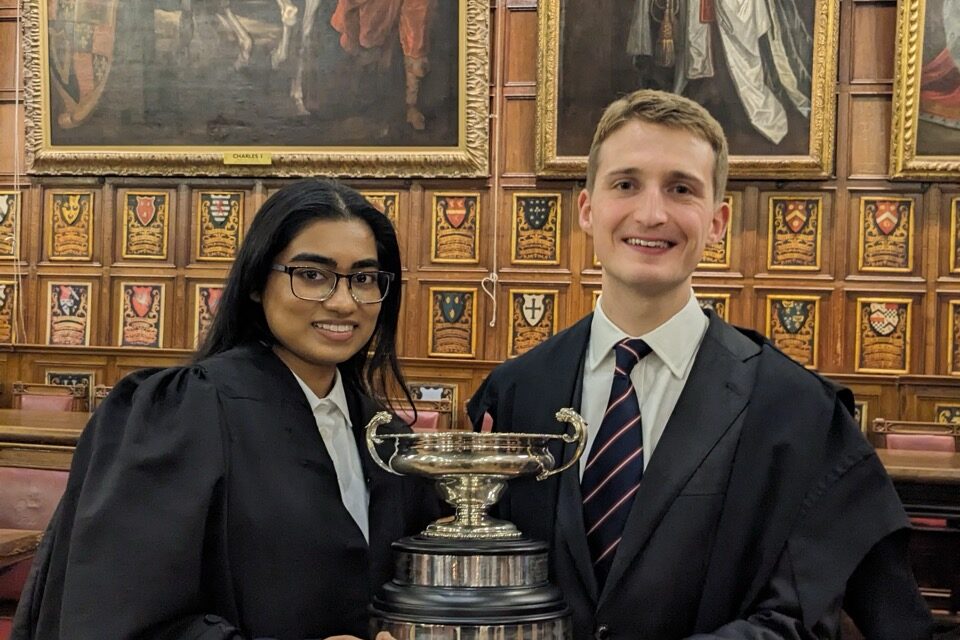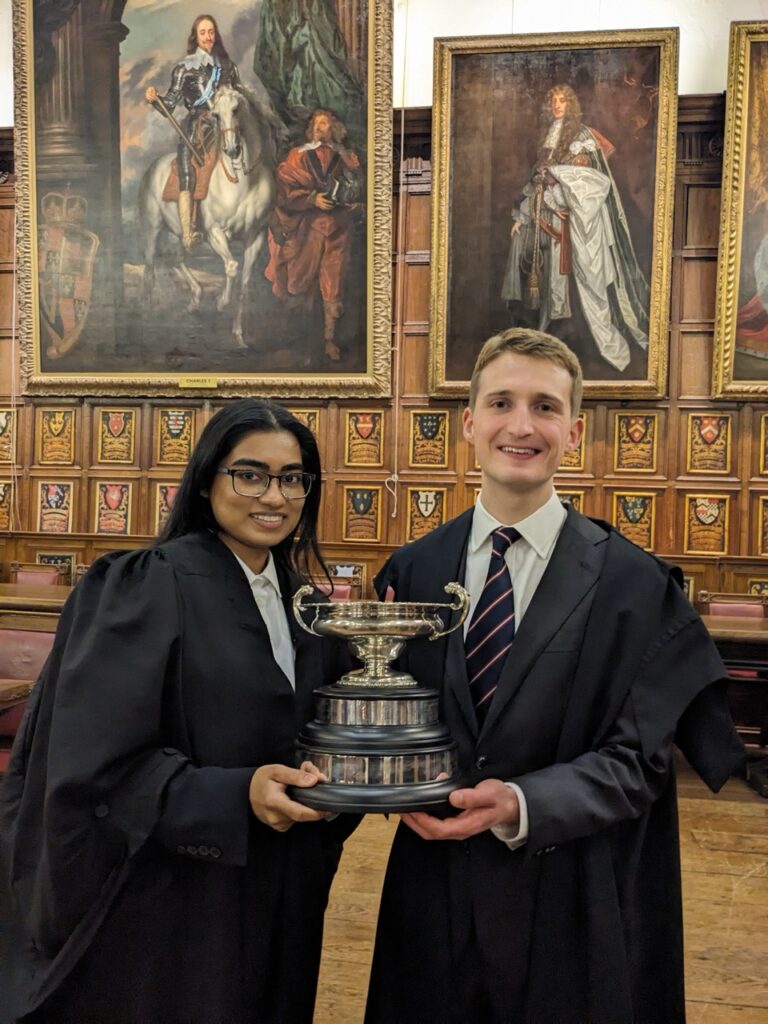
As the 2024 Rosamund Smith Moot gets underway, last year’s winners reflect on the 2023 competition.
It was a wonderful experience to participate in Middle Temple’s annual Rosamund Smith Moot. Not only did we improve our advocacy skills, we also had the opportunity to research topics that are covered only briefly in the law conversion course and to apply these to a case.
The mooting topics were diverse. The preliminary rounds comprised problems on balancing competing human rights, constructive and resulting trusts, confiscation orders, the open justice principle and medical negligence.
North Carolina exchange
One of the best parts of the competition was being given the chance, along with our fellow finalists, to represent the Inn in a long-running mooting exchange with the University of North Carolina. One week in September, the four of us flew to Raleigh, NC, along with Christa Richmond (Director of Education). We stayed in Chapel Hill, a beautiful campus town which is home to the university’s law school.
On Monday, we joined our fellow mooters from the NC team for morning lectures before applying the finishing touches to our moot submissions – easier said than done with jet lag. Tuesday arrived: the day of our first moot. We travelled to the historic Orange County Courthouse in Hillsborough and put our submissions to the test before the judges. One of the best things about the trip was that, with several friendly rounds covering the same moot problem, we all had the chance to represent both parties. This was something none of us had done before and afforded greater opportunity to hone our arguments between the rounds.
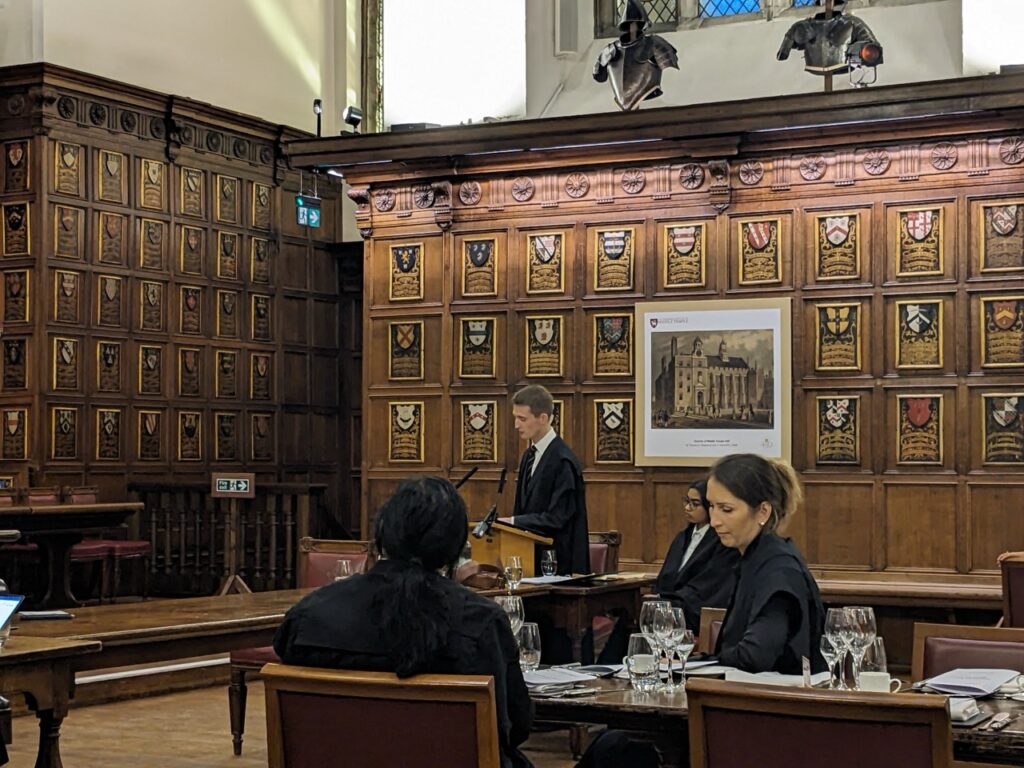
The NC moot problem
The moot problem concerned a restaurateur, repeatedly visited by two gentlemen offering a ‘protection service’ for his business. Frustrated by the lack of assistance he received from the police, and with the threats escalating to those of serious violence to himself and his family, the long-suffering restaurateur took matters into his own hands and killed both men. Charged with murder, he raised a defence of ’pre-emptive self-defence’. The grounds of appeal concerned (1) the directions given by the trial judge to the jury (in particular, on whether the threat to which one purports to respond in self-defence must be imminent) and (2) whether the trial judge placed improper pressure on the jury to convict, when it expressed its desire to acquit.
The following evening, we were joined in NC by Master Treasurer and his wife. Mooters, judges and academic staff dined together al fresco in the warm North Carolina evening ahead of the final two moot rounds the following day. These final rounds were held in the State Supreme Court in Raleigh. In the morning, we watched a real appeal case from the public gallery. The case concerned whether a claimant was ’resident’ for the purposes of an insurance claim and was heard before the full court. After lunch, we mooted before a bench comprising Master Treasurer and two retired US State Supreme Court justices. This is something we will all remember as a great privilege.
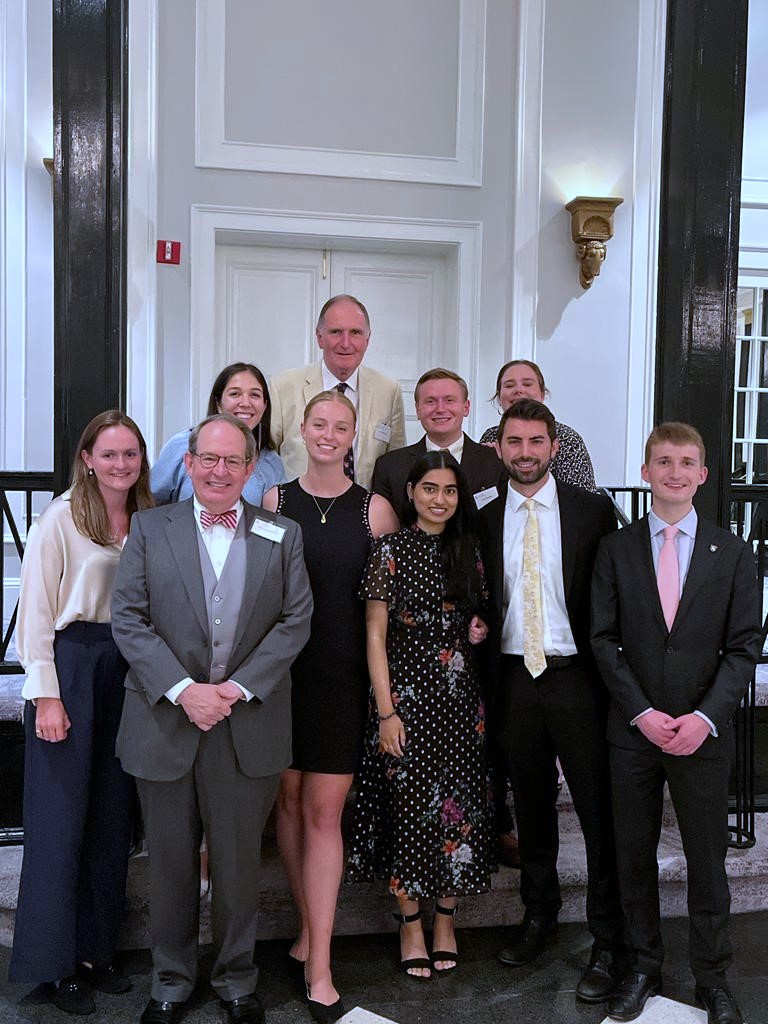
Reflections on the exchange
With the final round complete, we drove back to Chapel Hill for a formal dinner hosted by the university. It was good to celebrate and reflect on the week. We all learned a great deal from our week in the US and made many friends. Aside from the substantive legal issues, it was interesting to appreciate the similarities but also the differences in the style of advocacy between the US and UK teams. In a well-received after-dinner speech, Master Treasurer reflected on the similarities between our legal systems, on our shared history, and on the friendship between our nations.
That friendship was only increased by the wonderful exchange trip. All the finalists extend their warmest gratitude to the Inn and to the university for facilitating the trip: in particular to Christa Richmond (who started the initiative and organised the trip), to Rebecca Howell (whose kind hospitality while we were in Chapel Hill, from driving us around to taking us along to the ball game, made us all feel at home), and to Master Treasurer for judging the moot in the Supreme Court.
Back in London, we all had a few weeks’ respite before the Rosamund Smith Moot Final for 2023.
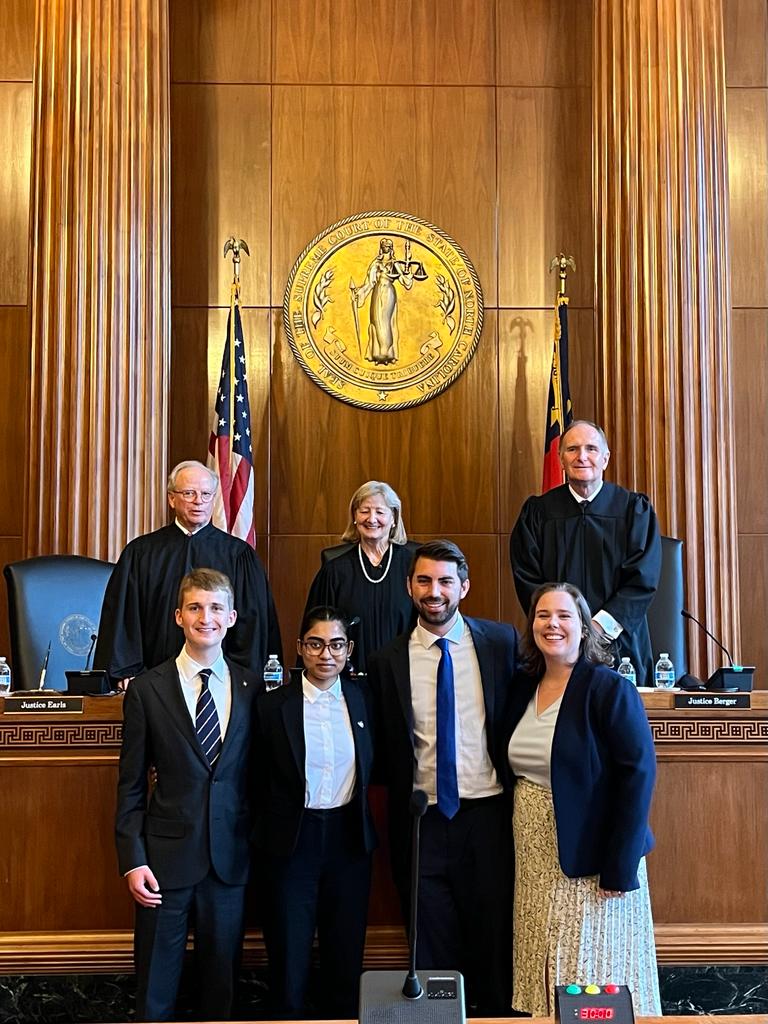
Rosamund Smith Final moot facts
The final moot problem addressed secondary liability: the criminal culpability of defendants who do not commit a particular criminal act but do assist or encourage its doing. The moot facts are briefly summarised below.
The Applicant and the principal offender (PO) were involved in a joint plan to commit a robbery in which the PO punched the victim extremely hard to his jaw, causing him to injure his head, and later pushed him into a nearby canal. A forensic pathologist concluded that the primary cause of death was asphyxia through drowning with the head injury having made a significant contribution to death.
The Applicant was convicted of murder as a secondary party and sentenced to detention at Her Majesty’s Pleasure for a minimum of 13 years. He sought exceptional leave to appeal to the Court of Appeal out of time in relation to two grounds:
- The trial judge summed up the law on joint participation in accordance with the correct principles at that time, but in light of Jogee [2016] UKSC 8, the legal directions were erroneous, rendering the conviction unsafe as the jury’s decision would likely have been different if directed in accordance with the current law; and
- In accordance with Jogee, the PO’s action of throwing the deceased into the canal amounted to an overwhelming supervening act (OSA) which had broken the chain of causation. In those circumstances, the Applicant was not liable for the death.
The law on secondary liability
At the heart of the moot stood the case of Jogee [2016] UKSC 8, which marked a dramatic departure from the old law on secondary liability. Prior to Jogee, the law had settled on the principle that, during a joint plan to commit a crime, if the secondary party foresaw the possibility of the PO committing a second and separate crime, then that foresight was enough to convict the secondary party for the second crime, even if he himself did not intend the commission of that offence (see Chan Wing-siu v The Queen [1985] AC 168; R v Powell and another; R v English [1997] 3 WLR 959).
Unsurprisingly, this stringent approach was heavily criticised and eventually overturned by the UK Supreme Court in Jogee, which held that foresight alone is not sufficient to establish accessory liability. Instead, the prosecution must now prove that the secondary party encouraged or assisted the PO in committing the crime while intending that the PO would act with the requisite mens rea. Foresight remains evidence of that intent, but nothing more. The justices further remarked that an accessory could be absolved from liability for death if it was ‘caused by some overwhelming supervening act by the perpetrator which nobody in the defendant’s shoes could have contemplated might happen and is of such a character as to relegate his acts to history’ (Jogee at [97]).
Application of the law to the moot facts
On the second ground of appeal, the moot judges found for the Respondents. The Applicant had agreed to a joint plan to commit a violent robbery near Regent’s Canal, which he had not departed from. He knew of the canal’s proximity and knew there might be violence. The PO’s act of throwing the deceased in the canal was not an overwhelming supervening act, as it was not an act that was so extraordinary as to interrupt the existing situation and so relegate the Applicant’s acts to history.
On the first ground of appeal, however, the moot judges found for the Applicant. Jogee stressed that if the crime requires a particular intent, then the accessory must intend to assist or encourage the PO to act with such intent (Jogee at [90]). In the case of murder, the relevant mens rea is the intention to kill or cause grievous bodily harm (GBH). The judges found no scope, either in the evidence or in the jury’s findings, for an inference that the Applicant intended that the PO would act with the intention of causing at least really serious harm. They concluded that a Jogee direction could have resulted in an acquittal. This irregularity had amounted to a substantial injustice, and the conviction was unsafe.
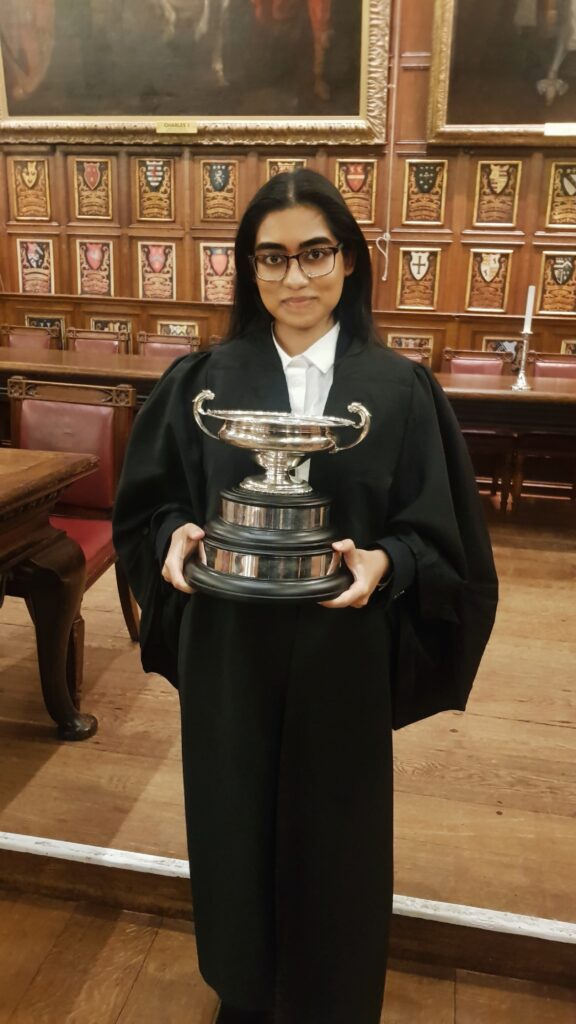
Farhana is a Queen Mother Scholar at Middle Temple who completed the Bar Course as an Advocacy Scholar at the University of Law. She is a tribunal advocate representing the Secretary of State at the First Tier Immigration Tribunal, with prior experience at the Department for Transport, Dag Hammarskjöld Foundation and Consortium for Street Children, working in international human rights and immigration matters.

Andrew is undertaking his graduate law course part-time while working in investment management. He previously completed a four-year master’s degree in chemistry at the University of Oxford.

